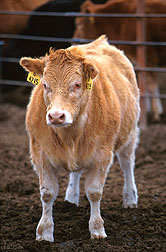This page has been archived and is being provided for reference purposes only. The page is no longer being updated, and therefore, links on the page may be invalid.
Genetic Testing Helps Single Out Leanness GeneBy Ben HardinJune 22, 1999 Genetic testing of cattle may soon help breeders plan sure-bet matings to make production more efficient and ensure consumers get lean but tender steaks. The key to this approach, according to Agricultural Research Service scientists, involves raising cattle with just one copy of a gene called inactive myostatin. Before birth, a calf with no copies of the inactive form produces a protein that limits the animal's potential to produce lean beef. ARS scientists at the Roman L. Hruska U.S. Meat Animal Research Center (MARC), Clay Center, Neb., found that carcasses from cattle with one inactive myostatin gene typically yield about 7 percent more edible lean beef than those from cattle without the gene. And the untrimmed carcasses have 14 percent less overall fat. A calf with two copies of inactive myostatin is extremely muscular in the hind quarters. That condition, called "double muscling," is undesirable because birth assistance is often needed. So the goal would be to produce slaughter animals with only one inactive copy of the gene. To do that and plan matings for herd replacements, breeders could use a genetic test to determine which forms of the genes animals have. Last fall, ARS and Celera AgGen, a PE Corporation business, entered a two-year Cooperative Research and Development Agreement to develop a genetic test aimed for commercial use. MARC research shows that cattle with the inactive myostatin produce beef with less marbling, or intramuscular fat, as well as less fat outside of muscle. But in this case, less marbling doesn't always mean less tender. The scientists expect to pinpoint numerous genes that together control tenderness. ARS is the chief research agency of the U.S. Department of Agriculture. An article about the beef leanness gene appears in the June issue of Agricultural Research magazine. The article is also online at: /is/AR/archive/jun99/beef0699.htm Scientific contact: Timothy P. Smith, ARS Roman L. Hruska U.S. Meat Animal Research Center, Clay Center, Neb., phone (402) 762-4366, fax (402) 762-4390, smith@map.marc.usda.gov; Paul Gilman, Celera Genomics, Rockville, Md., phone (240) 453-3302, fax (240) 453-3650, gilmanjp@celera.com. |

